Wikipedia:Picture of the day/May 2005
|
Featured picture tools: |
These featured pictures, as scheduled below, appeared as the picture of the day (POTD) on the English Wikipedia's Main Page in May 2005.
You can add an automatically updating POTD template to your user page using {{Pic of the day}} (version with blurb) or {{POTD}} (version without blurb). For instructions on how to make custom POTD layouts, see Wikipedia:Picture of the day.
May 1
[edit]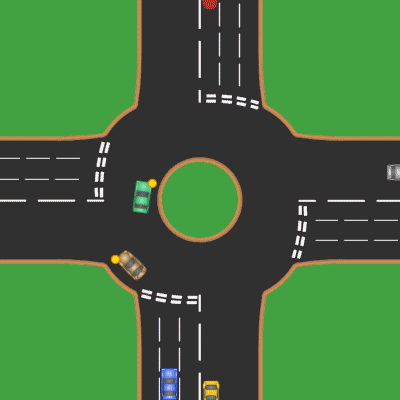
|
A diagram of movement within a roundabout in a country where traffic drives on the left. A roundabout is a type of road junction, or traffic calming device, at which traffic streams circularly around a central island after first yielding to the circulating traffic. Unlike with traffic circles, vehicles on a roundabout have priority over the entering vehicle, parking is not allowed and pedestrians are usually prohibited from the central island. Image credit: Fredrik and Mintguy |
Text version ( view - edit - talk - history ) - Condensed version ( view - edit )
May 2
[edit]
|
True tarantulas are all spiders of the family Theraphosidae, sometimes called bird spiders or monkey spiders, which are native to South America and Central America. However the name 'tarantula' is often loosely applied to a range of large spiders. The name was originally applied to the Wolf spider Lycosa tarantula, found near the town of Taranto in Southern Italy, that was once believed to cause a fatal condition called tarantism. Photo credit: Fir0002 |
Text version ( view - edit - talk - history ) - Condensed version ( view - edit )
May 3
[edit]
|
Three types of cell reproduction; Binary fission and reproduction involving mitosis or meiosis. In the context of reproduction of living cells, "cell growth" refers to the "growth in cell numbers by means of cell reproduction." During cell reproduction one cell (the "parental" cell) divides to produce daughter cells. In other contexts, "cell growth" refers to increases in cell size. Image credit: John Schmidt |
Text version ( view - edit - talk - history ) - Condensed version ( view - edit )
May 4
[edit]
|
A timed exposure of the first Space Shuttle mission, STS-1. The shuttle Columbia stands on launch pad A at Kennedy Space Center, the night before launch. The objectives of the maiden flight were to check out the overall Shuttle system, accomplish a safe ascent into orbit and to return to Earth for a safe landing. Photo credit: NASA |
Text version ( view - edit - talk - history ) - Condensed version ( view - edit )
May 5
[edit]
|
A large Australian garden orb weaver spider sits perched on its web, eating a bee. The bee was caught on the sticky web, then encased in a cocoon-like shell before being consumed by the large spider. The spider's large, rounded body is especially notable. Photo credit: Fir0002 |
Text version ( view - edit - talk - history ) - Condensed version ( view - edit )
May 6
[edit]
| |
| The skyline of the City of Chicago seen from across Lake Michigan near the Adler Planetarium at dusk. Chicago is the third largest city in the United States (after New York City and Los Angeles), with an official population of 2.9 million.
Photo credit: AllyUnion | |
Text version ( view - edit - talk - history ) - Condensed version ( view - edit )
May 7
[edit]
|
Spot Fetcher — U.S. President George W. Bush's dog. The English Springer Spaniel is a gun dog used for flushing and retrieving game. This spaniel is an older breed, appearing in paintings as early as the 1600s. It is possibly the ancestor of most modern spaniels; Springer spaniels and cocker spaniels were not recognized as separate breeds until the 1800s. Photo credit: Paul Morse |
Text version ( view - edit - talk - history ) - Condensed version ( view - edit )
May 8
[edit]
|
The Tower of Hanoi is a mathematical game or puzzle, in which a stack of different sized disks have to be moved between three pegs whilst obeying a simple set of stacking rules. The puzzle was invented by Edouard Lucas in 1883, but today it is most popular as an introductory algorithm problem in computer science. Image credit: Aka |
Text version ( view - edit - talk - history ) - Condensed version ( view - edit )
May 9
[edit]
|
Che Guevara statue at the site of his death in Bolivia. Che Guevara was an Argentine-born Marxist revolutionary and Cuban guerrilla leader. Guevara was a member of Fidel Castro's 26th of July Movement, which seized power in Cuba in 1959. After the revolution Guevara became second only to Fidel Castro in the new government of Cuba. Photo credit: Augusto Starita |
Text version ( view - edit - talk - history ) - Condensed version ( view - edit )
May 10
[edit]
|
A magnification series of a snow crystal using a low temperature scanning electron microscope with magnification up to 100,000X, compared to 30X – 500X available with a light microscopes. Snow samples are very fragile and exposure to the light necessary to photograph them, using light microscopes, can damage the crystals and even melt them. A low temperature SEM operating at -170°C avoids disturbing the structure. Photo credit: USDA Beltsville Agricultural Research Unit |
Text version ( view - edit - talk - history ) - Condensed version ( view - edit )
May 11
[edit]
|
Red sky at night, sailors delight. Red sky in the morning, sailors take warning. Photo credit: Denni Windrim |
Text version ( view - edit - talk - history ) - Condensed version ( view - edit )
May 12
[edit]
| |
|
A Von Kármán vortex street is a repeating pattern of vortices commonly produced as air, or a fluid, flows past a fixed obstacle. The effect is named after the aerodynamicist Theodore von Kármán, who accidentally discovered it in 1911 during pioneering wind tunnel investigations to determine the best shape for spars in a biplane's wing. Animation credit: Cesareo de La Rosa Siqueira | |
Text version ( view - edit - talk - history ) - Condensed version ( view - edit )
May 13
[edit]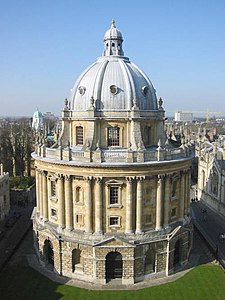
|
The Radcliffe Camera in Oxford, England was built by James Gibbs between 1737 and 1749 to house the Radcliffe Science Library. The building was funded by a £40,000 bequest from John Radcliffe. After the Radcliffe Science Library eventually moved into another building, the Radcliffe Camera became a reading room of the Bodleian Library. It now holds books from the English and History collection. Photo credit: Michael Reeve |
Text version ( view - edit - talk - history ) - Condensed version ( view - edit )
May 14
[edit]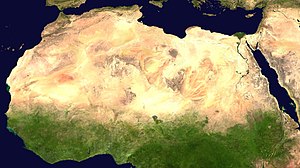
|
The Sahara, in northern Africa, is the world's second largest desert (second to Antarctica). Its name is an English pronunciation of the Arabic word for desert (صحراء Photo credit: NASA |
Text version ( view - edit - talk - history ) - Condensed version ( view - edit )
May 15
[edit]
|
The Madrid metro is the large metro system serving Madrid, the capital of Spain. It is one of the largest metro systems in the world, despite Madrid having a population of only four million. The metro opened in 1919 under the direction of the Compañía de Metro Alfonso XIII. Metro stations served as air raid shelters during the Spanish Civil War. Image credit: Montrealais |
Text version ( view - edit - talk - history ) - Condensed version ( view - edit )
May 16
[edit]
|
The is a member of Curculionidae — the family of the "true" weevils (or snout beetles). With over 60,000 species described worldwide, it is the largest of beetle families. Weevils are almost entirely plant feeders, and most species are associated with a narrow range of hosts, in many cases only living on a single species. Photo credit: Keith Weller of the US ARS |
Text version ( view - edit - talk - history ) - Condensed version ( view - edit )
May 17
[edit]
|
Soldiers of an Australian 4th Division field artillery brigade on a duckboard track passing through Chateau Wood, near Hooge in the Ypres salient, October 29, 1917. The photo was taken in the vicinity of the Battle of Passchendaele, also known as the Third Battle of Ypres, which was one of the major battles of World War I. Photo credit: James Francis Hurley |
Text version ( view - edit - talk - history ) - Condensed version ( view - edit )
May 18
[edit]
|
Mites and ticks are among the most diverse and successful of all the invertebrate groups. They have exploited an incredible array of habitats and because of their small size (some are truly microscopic) most go totally unnoticed. Many live freely in the soil, but there is also a vast array of species that live as parasites on plants or animals. This SEM image of a Peacock mite shows an animal less than 0.5 mm long. Photo credit: Betsvill ARC USDA |
Text version ( view - edit - talk - history ) - Condensed version ( view - edit )
May 19
[edit]
|
The focus of the Lincoln Memorial is this sculpture of Abraham Lincoln, seated. Daniel Chester French studied many of Mathew Brady's photographs of Lincoln, and depicted the president as worn and pensive, gazing eastwards down the Reflecting Pool at the capital's starkest emblem of the Union, the Washington Monument. One hand is clenched, the other open. Beneath his hands, the Roman fasces, symbols of the authority of the Republic, are sculpted in relief on the seat. Photo credit: Raul654 |
Text version ( view - edit - talk - history ) - Condensed version ( view - edit )
May 20
[edit]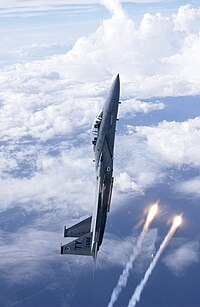
|
The F-15 Eagle is a multi-role tactical fighter designed by McDonnell Douglas. The first flight of the F-15A was in July 1972, but since then it has been produced in six model variations with both single seat and dual seat versions. The original and largest operator of the F-15 is the United States Air Force, but it is also operated by the air forces of Israel, Japan, Saudi Arabia and soon South Korea too. The F-15 can climb at a rate of 50,000 ft/min. Photo credit: Staff Sgt. Jeffrey Allen, USAF |
Text version ( view - edit - talk - history ) - Condensed version ( view - edit )
May 21
[edit]
|
Brisbane at night. Brisbane is the capital city of the state of Queensland, Australia. It is situated in the southeast corner of Queensland and straddles the Brisbane River. The city is named after Sir Thomas Brisbane, a soldier and colonial administrator born in Ayrshire, Scotland. Photo credit: Gary Curtis |
Text version ( view - edit - talk - history ) - Condensed version ( view - edit )
May 22
[edit]
|
Parachuting, or skydiving, is a recreational activity, competitive sport and method of deployment of military personnel. It involves the breaking of a free fall from a height through the use of a parachute. Many military organisations around the world still train paratroop forces, although since their first use in the Second World War nearly all deployments of paratroopers in active combat have been unsuccessful or disastrous. Photo credit: Airman Chris Otsen, U.S. Navy |
Text version ( view - edit - talk - history ) - Condensed version ( view - edit )
May 23
[edit]
|
A mad scientist is a stock character, often villainous, who appears in fiction as a scientist who is insane or eccentric. He is usually working with some utterly fictional technology in order to forward his evil schemes. Recent mad scientist depictions are often satirical and humorous, and some are actually protagonists, such as Dexter in the cartoon series Dexter's Laboratory. Image credit: J.J. McCullough |
Text version ( view - edit - talk - history ) - Condensed version ( view - edit )
May 24
[edit]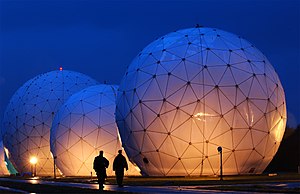
|
A radome (or radar dome) is a weatherproof enclosure used to protect an antenna. It is used mainly to prevent ice (especially freezing rain) from accumulating directly onto the metal surface of the antenna. For stationary antennas, excessive amounts of ice can de-tune the antenna to the point where its impedance at the input frequency rises drastically. This can lead to reflected power going back to the transmitter, where it can cause overheating. Photo credit: JO1 Preston Keres U.S. Navy |
Text version ( view - edit - talk - history ) - Condensed version ( view - edit )
May 25
[edit]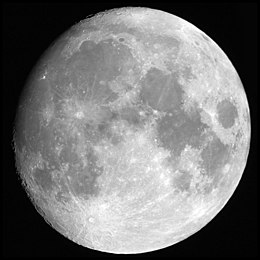
|
The Moon is the only natural satellite of Earth. During the ancient period, it was not uncommon for cultures to believe that the Moon died each night, thus descending into the underworld. As late as the 1920s (or so), it was believed that the Moon might have a breathable atmosphere. In 1969, Neil Armstrong and Buzz Aldrin became the first humans to land on the Moon. Photo credit: Michael K. Fairbanks |
Text version ( view - edit - talk - history ) - Condensed version ( view - edit )
May 26
[edit]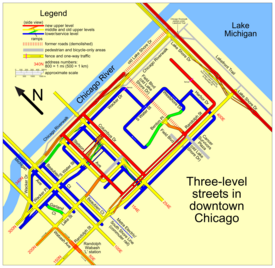
|
This map shows the complex interplay of the Multilevel streets in Chicago. Several major cities around the world have attempted to overcome problems with traffic density by building elevated or underground roadways. Chicago, Illinois goes one better with some triple-decker streets in an area of downtown beside the Chicago River and Lake Michigan. Illustration credit: User: SPUI |
Text version ( view - edit - talk - history ) - Condensed version ( view - edit )
May 27
[edit]
|
View of Paris from the Notre-Dame showing the River Seine and the Eiffel Tower. The Notre-Dame de Paris is a gothic cathedral on the eastern half of the Île de la Cité in Paris, France. The cathedral is probably best known from Victor Hugo's novel, The Hunchback of Notre Dame, which was first published in 1831. The gargoyle pictured here is a non-functional 19th century addition by restorer Eugène Viollet-le-Duc, and postdates Hugo's novel. Photo credit: Michael Reeve |
Text version ( view - edit - talk - history ) - Condensed version ( view - edit )
May 28
[edit]
|
Frédéric Chopin is widely seen as the greatest of Polish composers and among the very greatest of composers for the piano. Chopin principally wrote salon music for the solo piano in a range of musical styles. He developed on the nocturne, invented by John Field, taking it to a deeper level of sophistication. He was also the first to write ballades (a genre he invented) and the scherzi as individual pieces. This is the only known photograph of Frédéric Chopin, taken during the degenerative stages of his tuberculosis. Photo credit: Unknown |
Text version ( view - edit - talk - history ) - Condensed version ( view - edit )
May 29
[edit]
| |
| The painter's algorithm is one of the simplest solutions to the visibility problem in 3D computer graphics. When projecting a 3D scene onto a 2D plane, it is at some point necessary to decide which polygons are visible and which are hidden. The distant mountains are painted first, followed by the closer meadows; finally, the closest objects in this scene - the trees - are painted. For detailed scenes, the painter's algorithm generally proves to be a slow solution.
Illustration credit: Fredrik | |
Text version ( view - edit - talk - history ) - Condensed version ( view - edit )
May 30
[edit]
|
A cemetery is a place (usually an enclosed area of land) in which dead bodies are buried. From the 7th to the late 18th century, European burial was under the control of the church and on sacrosanct church ground. Municipal or independent cemeteries, as we now know them, date from the early 19th century. The earliest being Pere Lachaise in 1804 in Paris. The idea then spread through Europe with the Napoleonic invasions. Photo credit: Brookie |
Text version ( view - edit - talk - history ) - Condensed version ( view - edit )
May 31
[edit]
|
The Gold Coast is a coastal region approximately 70 kilometres south of Brisbane, Australia that, over the past 50 years, has coalesced from a collection of scattered villages into a city of approximately 400,000 people. The subtropical climate, attractive surf beaches, and savvy marketing have attracted millions of tourists. Photo credit: Gary Curtis |
Text version ( view - edit - talk - history ) - Condensed version ( view - edit )
Picture of the day archives and future dates
